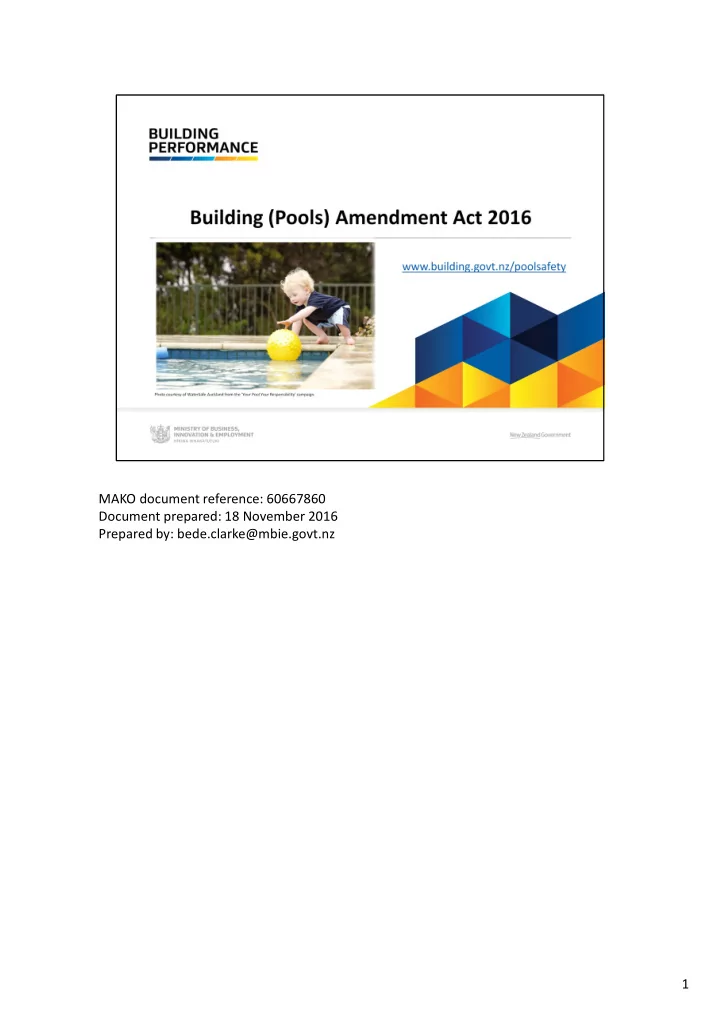

MAKO document reference: 60667860 Document prepared: 18 November 2016 Prepared by: bede.clarke@mbie.govt.nz 1
2
Scientific evidence shows that fencing reduces drowning (Thompson and Rivara 1998). Drownings decreased dramatically after the Fencing of Swimming Pools Act was enacted in 1987. Before pool fencing legislation was enacted, an average of 10 children per year drowned in home pools. Currently, an average of two children per year drown in home pools. The Building (Pools) Amendment Act 2016 (the Amendment Act) aims to further reduce that rate of drowning. Most of the children who drowned in home pools were toddlers (80 per cent were under three years of age). Data source: Water Safety New Zealand, drowning in home pools between 1993 and 2012. 3
Reason for mandatory inspections Almost all drownings have occurred in non-compliant pools. • Territorial authorities found that half of the pools they inspected were non-compliant • (mostly due to lack of normal maintenance, such as tightening the spring in the gate). Mandatory inspections are expected to improve levels of compliance, and are • estimated to avoid six drownings per decade. Key requirements Territorial authorities must ensure that all residential pools are inspected at least every three years to verify that the pools continues to comply with the pool barrier requirements. This requirement does not apply to small heated pool (spa pools and hot tubs) where the barrier is a safety cover. Independently qualified pool inspectors 4
The Amendment Act allows independently qualified pool inspectors (IQPIs) as well as territorial authorities (TAs) to carry out mandatory inspections. This provides pool owners with choice and convenience. The Ministry of Business, Innovation and Employment (MBIE) will be responsible for administering the IQPI regime. MBIE’s aim is to ensure that IQPIs are reliable, so that territorial authorities can rely on inspections carried out by IQPIs without question. MBIE will be assessing people who apply to be accepted as an IQPI (including their knowledge of the Building Code in relation to pool barriers, their competence in carrying out inspections). MBIE will be monitoring and reviewing the performance of IQPIs (e.g. by carrying out audits). MBIE could, if necessary, deregister an IQPI. 4
Small heated pools with safety covers will comply with the pool barrier requirements (if they meet the requirements listed in the slide). Most small heated pools are currently unfenced but have a safety cover. The Amendment Act reflects this reality. Drownings in small heated pools are rare. MBIE is currently consulting on Acceptable Solutions for safety covers. The Acceptable Solutions will provide one way of complying with Building Code requirements for safety covers. Consultation closes on 16 December 2016. You can download the consultation document by going to MBIE’s consultation webpage or www.building.govt.nz/poolsafety 5
The legislative provisions for residential pools will be in the Building Act. The Fencing of Swimming Pools Act 1987 will be repealed. Enforcement tools The Amendment Act provides territorial authorities with more effective tools for enforcing the pool barrier requirements: notices to fix, infringement notices and prosecution. By contrast, prosecution is the only enforcement tool available under the Fencing of Swimming Pools Act. Waivers and modifications Territorial authorities will be able to grant waivers and modifications of the pool barrier requirements, in a similar way that they grant waivers and modifications of the Building Code for other building work. In particular: the waiver or modification decision can be delegated to an officer of the territorial • authority parties can appeal the decision by seeking a determination by MBIE. • By contrast, the Fencing of Swimming Pools Act has a special exemption process where all exemption decisions must be made by resolution of elected councillors. There was no right of appeal. 6
Requirements for doors in the pool barrier The Amendment Act clarifies that doors in the pool barrier must have self-closers or door alarms. This requirement helps to ensure that adults and older children keep doors closed. The Building Code has been interpreted as requiring all doors to have a self-closer or other means of restricting access. MBIE is currently consulting on Acceptable Solutions for door alarms. Garden ponds and similar water hazards The Amendment Act clarifies that pool barrier requirements will not apply to garden ponds and similar water hazards. The Fencing of Swimming Pools Act has been interpreted as applying to garden ponds and similar water hazards. However, this requirement has seldom been enforced in relation to garden ponds and similar water hazards. 7
For more information Website: www.building.govt.nz/poolsafety Email: info@building.govt.nz Phone: 0800 24 22 43 8
Recommend
More recommend